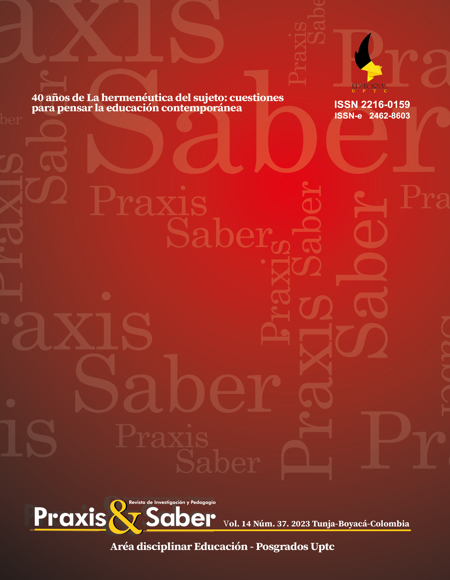International collaborative learning experience between Higher Education Institutions in Colombia and Chile

Abstract
Introduction: As a result of the global situation caused by the pandemic, it became a priority for Higher Education Institutions to find simple internationalization strategies that could be adapted to different realities, in order to maintain learning processes and relationships between students, teachers, and the institutions themselves. Objective: The article focuses on an educational experience based on the strategy of Collaborative International Online Learning (COIL), which purpose is to train students in intercultural competencies, as a response to the growing demand for professionals with the ability to face the challenges of educational globalization in their future work practice. Methodology: A COIL strategy was implemented, within the framework of an educational action-research, which had the objective of promoting spaces for the internationalization of the curriculum at home, through international inter-university cooperation between two undergraduate programs of South American higher education institutions. Results: The strategy used created spaces for intercultural dialogue between students and professors, thus allowing for a feeling of recognition to rise among them. This confirmed the relevance of promoting these practices in undergraduate training processes, as they are necessary to face a globalized world.
Keywords
international cooperation, E-Learning, online learning, cultural education, globalization
References
- Calbet, M. (2020). Cooperación para la inclusión universitaria a través de la internacionalización de la Educación Superior en Chile. En Estrategias para la inclusión a través de la internacionalización (pp. 23-34). Colección Universidad y Territorio, Editorial UVM, https://dialnet.unirioja.es/servlet/articulo?codigo=8009416
- Casas, J., Sánchez, M., & Hilerio, Á. (2021). Aprendizaje basado en problemas: el adulto mayor en los contextos de Colombia y México. Una experiencia COIL entre la Universidad del Rosario y la Universidad de Colima. Reflexiones Pedagógicas, (28). https://doi.org/10.12804/issne.2500-5979_10336.31958_ceap DOI: https://doi.org/10.12804/issne.2500-5979_10336.31958_ceap
- Cipagauta, M. (2022). Collaborative Online International Learning: Technology Applied to Education. TECHNO REVIEW, International Technology, Science and Society Review, 11(2), 293–301. https://doi.org/10.37467/revtechno.v11.3466 DOI: https://doi.org/10.37467/revtechno.v11.3466
- Expósito, D., & González, J. (2017), Sistematización de experiencias como método de investigación. Gaceta Médica Espirituana, 19(2), 10-16.
- Guevara, G., Verdesoto, A., & Castro, N. (2020). Metodologías de investigación educativa (descriptivas, experimentales, participativas, y de investigación-acción). Recimundo, 4(3), 163-173.
- Gutiérrez-Peláez, M., & Ellis, K. (2020). Aprendizaje intercultural. Experiencias de Collaborative Online International Learning (COIL) entre la Universidad del Rosario y la Universidad Americana del Cairo en Egipto. Reflexiones Pedagógicas, (23), 1-7
- Guzmán, D., Castillo, A., & Betancourth, S. (2023). Cooperación Internacional: Un desafío en la Educación Superior Pública y Regional. Entramado. 19(1), 1-12. https://doi.org/10.18041/1900-3803/entramado.1.9673 DOI: https://doi.org/10.18041/1900-3803/entramado.1.9673
- Hincapié, D., Ramos, A., & Chrino-Barceló, V. (2018). Aprendizaje Basado en Problemas como estrategia de Aprendizaje Activo y su incidencia en el rendimiento académico y Pensamiento Crítico de estudiantes de Medicina. Revista Complutense de Educación, 29(3), 665-681. http://dx.doi.org/10.5209/RCED.53581 DOI: https://doi.org/10.5209/RCED.53581
- Ladino-Marín, P., & Salazar-Acosta, L. (2023). La internacionalización en la educación superior latinoamericana, una revisión documental. Cuaderno de Pedagogía Universitaria, 20(39), 9-19. DOI: https://doi.org/10.29197/cpu.v20i39.477
- Marcano-Navas, N. (2021). La internacionalización del currículo en la educación superior colombiana. Revista de Investigación, 45(104), 111-136.
- Marcillo, M., & Desilus, B. (2016). Collaborative Online International Learning experience in practice: opportunities and challenges. Journal of Technology Management & Innovation, 11(1), 30-35. DOI: https://doi.org/10.4067/S0718-27242016000100005
- Marotias, A. (2020). La educación remota de emergencia y los peligros de imitar lo presencial. Revista Hipertextos, 8(14), 173-177. https://doi.org/10.24215/23143924e025 DOI: https://doi.org/10.24215/23143924e025
- Mason, F. (2015). Educación para una ciudadanía global y aprendizaje intercultural: obstáculos y oportunidades. Si Somos Americanos [online], 15(2), 67-95. http://dx.doi.org/10.4067/S0719-09482015000200004. DOI: https://doi.org/10.4067/S0719-09482015000200004
- Meza, O. (2020). El Modelo COIL, una experiencia intercultural transformadora. En J. Barajas (Coord.), Memoria del XX Encuentro de Formación Docente. Verano de 2020 (pp. 401–428). Con-textos
- Orantes, B. (2019). Retos de la internacionalización universitaria para América Latina en el marco de la cooperación Sur-Sur. Entorno, (68), 88–96. https://doi.org/10.5377/entorno.v0i68.8448 DOI: https://doi.org/10.5377/entorno.v0i68.8448
- Pineda, C., Hennig, C., Segovia, Y. (2013). Pedagogical models, collaborative work and interaction on online undergraduate programmes in Colombia: still some way to go. En Education and Technology in Mexico and Latin America: Outlook and Challenges [Online dossier], Universities and Knowledge Society Journal (RUSC), 10(2), 431-445. http://dx.doi.org/10.7238/rusc.v10i2.1739 DOI: https://doi.org/10.7238/rusc.v10i2.1739
- Ramírez, A., & Bustos-Aguirre, M. (2022). Beneficios, inconvenientes y retos de los cursos COIL: las experiencias de los académicos. Revista Educación Superior y Sociedad, 34(2), 328-352. https://doi.org/10.54674/ess.v34i2.579 DOI: https://doi.org/10.54674/ess.v34i2.579
- Tabares-Márquez, C., & González-Pérez, M. (2022). La cooperación interuniversitaria Canarias-Cabo Verde: perspectivas complementarias, perspectivas enfrentadas. Revista Española de Educación Comparada, (40), 190-214. https://doi.org/10.5944/reec.40.2022.30311 DOI: https://doi.org/10.5944/reec.40.2022.30311
- Vaccarezza, M. (2020). Docencia remota de emergencia frente al covid-19 en una escuela de medicina privada de chile [Tesis de Maestría en Educación Médica para las Ciencias de la Salud, Universidad de Concepción]. http://repositorio.udec.cl/jspui/handle/11594/617
- Villarroel, V., Pérez, C., Rojas-Barahona, C., García, R. (2021). Educación remota en contexto de pandemia: caracterización del proceso educativo en las universidades chilenas. Formación Universitaria, 14(6), 65-76. http://dx.doi.org/10.4067/S0718-50062021000600065 DOI: https://doi.org/10.4067/S0718-50062021000600065
